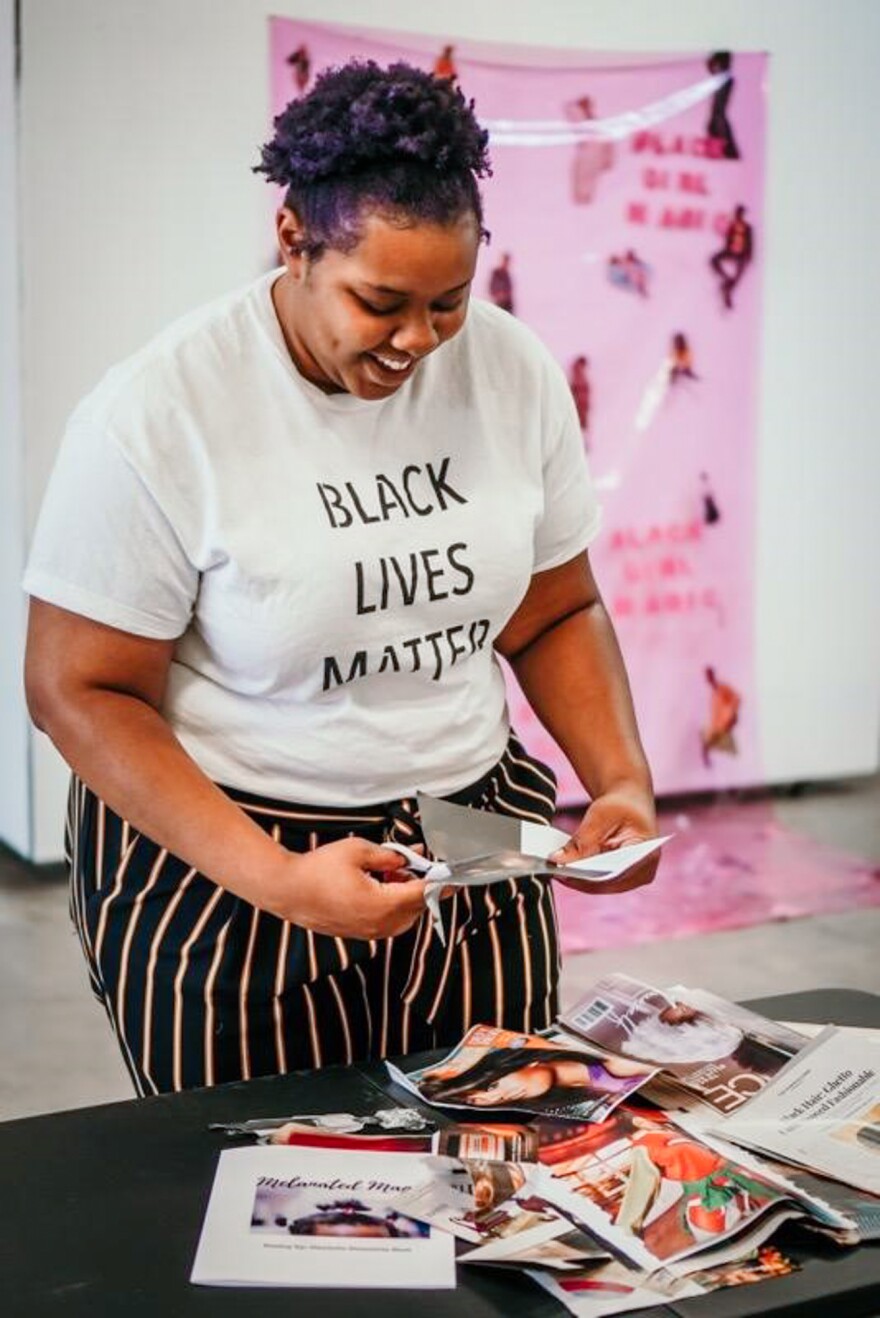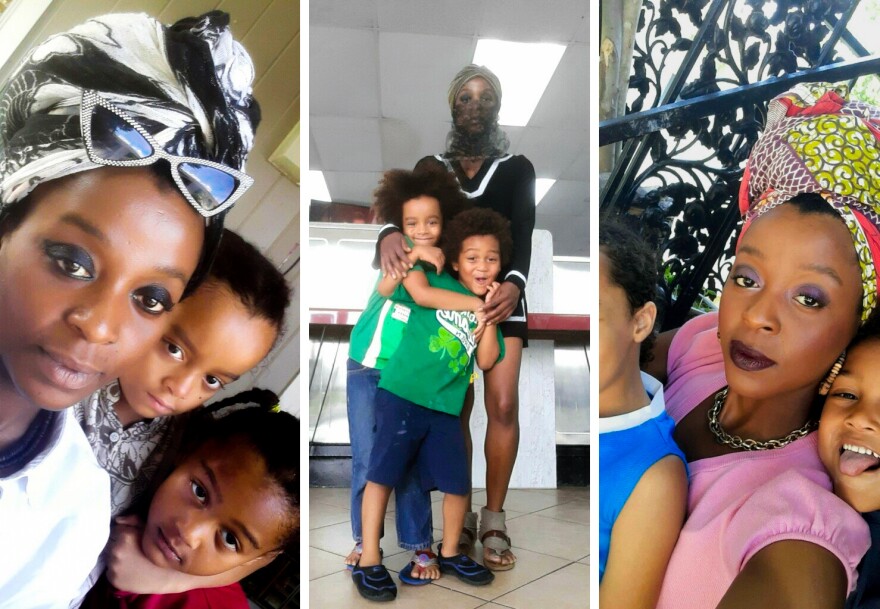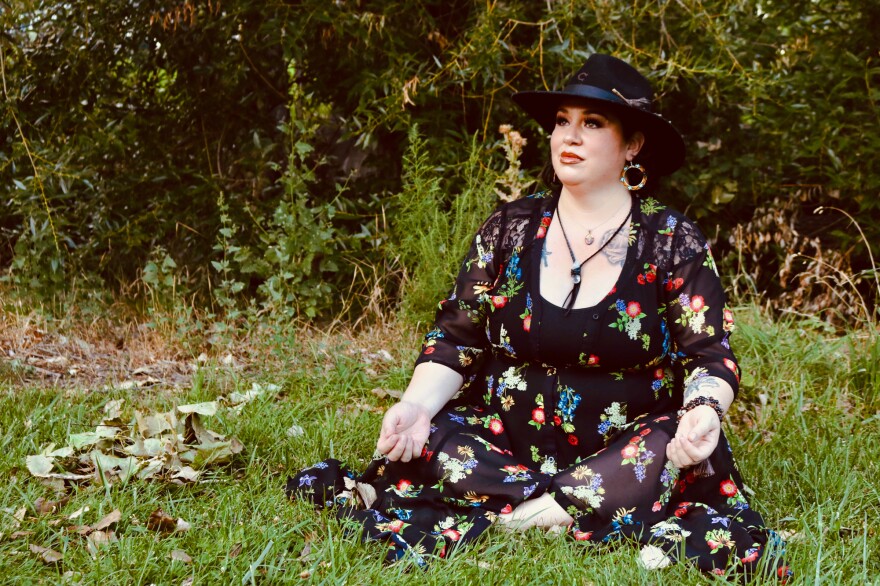Is there a woman in your community who has overcome great challenges in their personal lives during the pandemic?
In October, we asked our audience this question. It's part our special report that profiled 19 remarkable women across the globe who – despite the crisis — are surviving and thriving.
NPR received over 50 nominations for this call out. Many are women whose lives were upended by the pandemic — but found a way to make the most of their situation, for themselves or their communities. An artist who lost her job raised funds to buy art supplies for children in her neighborhood. A doctor in Yemen, a country grappling with a civil war, drives up to five hours to educate patients about the coronavirus in remote villages. A newly single mom of two finds strength in a saying from her Congolese heritage.
Here are seven stories of women making a difference. These interviews have been edited for length and clarity.
'Don't quit'

Danielle Demetria East, 23, is an artist in Lubbock, Texas.
Before the pandemic, I was working days, nights and weekends. I was always too tired to make art or a difference in my community. I was looking for a sign or some change to happen.
Suddenly, after the pandemic hit, I didn't have work.
Then it struck me. What can I do with all this time I couldn't do before? I started doing collages, which I have never really done. I also wanted to give back to the community of East Lubbock, which is predominately people of color. There aren't a lot of resources or support for artists of color.
I started applying for grants in the beginning of the pandemic, and used the money to make to encourage them to create in different mediums. They get a canvas and watercolors, art supplies I wish I had when I was a kid. When I first told people about this, they asked me: What if you don't get the money for it? I said I will just keep working on it.
We don't know how long the pandemic is going to last. You have to be open to change and learning new skills. Don't quit. It might not turn out well this time, but just keep doing stuff.
Don't hold yourself to 'pre-pandemic standards'

Crystal Watts, 36, is a mentor to medical students at the Medical College of Georgia, a breast cancer patient, PhD candidate and mother of three children in Evans, Ga.
When things started happening in March, my husband got laid off. The schools closed down. Then I discovered a lump on my breast. It was awful and surreal. We had so much drama going on. Cancer was just another thing.
I just finished six rounds of chemo. I have been sick most of the pandemic.
In my low moments, I think, "What would Eva Mae do right now?" She was my grandma. She was very strong-willed and if she decided to do something or not do something that was what was going to happen. She was like a train. She got her GED in her 50s after raising eight children and being a civil rights activist in Mississippi. She walked across the bridge at Selma.
You got to put one foot in front of the other and keep going. This awful situation is not supposed to last forever. That's what I keep telling myself every day. I am on the other side of chemo and finally getting a taste of it not lasting forever.
People are still trying to hold themselves to pre-pandemic standards. You can't. Just pause and revaluate things. Are you doing things that are necessary?
I am the first to tell you that my house is a mess right now. The kids are a mess, but the kids are going to catch up. You do what you can. Identify what the key parts are. Everyone needs to be fed and housed. So, we just take care of basic needs around here. If you miss the mark, you can't kick yourself about it.
'Don't squander this moment'

Tammy Elser, 60, teaches at Salish Kootenai College on the Flathead Indian Reservation, near Missoula, Mont.
I just shifted to teaching fully online because of the pandemic. I miss the interaction with my students. I feel joy getting up in front of a classroom. I live for it.
It's a challenge to try to figure out how to teach online creatively. You can't simply step online and do the same kind of activities you would ordinarily do in person.
Parents, teachers, former and current students contact me about what to do with their children and students. They're overwhelmed.
I tell them to get really, really basic. There are ways of authentically coming together in smaller groups on virtual platforms to talk about a book we have all read. That's a social opportunity and our kids are very lonely.
The opportunity here is that we as a society have been forced to pause. That pause could actually get the students to do the things that are most beneficial: reading, writing, reflecting, journaling, doodling, scribbling, writing slivers of poems, thinking deep thoughts, expressing sadness, expressing joy. I hope we don't squander this moment to reset from our flat-screen environments. We should be putting books in the hands of our children.
'Your responsibility is to also continue'

Dr. Nebras Khaled, 33, is a virologist, a doctor and health program manager for International Medical Corps, a humanitarian group, in Sana'a, Yemen.
In Yemen, our situation is different than other countries. We have had medicine shortages since the war started in 2015, but when the pandemic came in April, it got worse. We can't ship or receive anything because of the war. But my biggest challenge was not getting the medicine we needed, it was convincing people in my community to change their behavior, like social distancing and hand washing and wearing masks. Gathering is part of our tradition. It takes a long time to separate tradition from behavior. I don't give up. I take pride in my work.
The first thing I did for my community was to raise awareness. I got them information about the virus and how it spreads, and got them the minimum personal protection equipment through the nonprofit I work for, International Medical Corps. I work with community leaders and volunteers in Sana'a's districts to educate people about the virus and how to be safe. From my home, I drive about five hours by car to reach the farthest health facility to educate and screen patients for the virus.
My family always supports me. They make me strong. Every day, when I come home from work tired, my mom asks me about my day and she always reminds me you are human and everyone around you is human. Your responsibility isn't just to protect others, your responsibility is also to continue. She tells me I am not here to fight COVID-19 or to end a pandemic, I am here to make people healthy.
'Slow down or you will crash'

Josianne Modelo, 33, is a single mother of two sons and lives in Houston.
It's 100% hustle to survive. Just before the pandemic, I left a 10-year abusive relationship with the father of my two sons. He was completely certain that I would go back to him during the pandemic, but I didn't. I stayed strong and resisted and stood my ground.
Now, I have two sons to keep a roof over their heads and feed all on my own. I have to really push myself. I work around 80 hours a week. I clean houses and look after sick people as a home healthcare aide. It's nonstop.
I get strength by remembering my African family. We escaped the wars in Congo and came to America when I was 3 years old. I come from a family of very strong women who raised me. They said little, but their wisdom, strength and the authority in their voices ring in my head years later. The women would gather together to pray, braid hair, cook fufu [plantains] and give advice. When I started growing up, I realized that woman is me, too.
I'm an anxious type-A person always rushing to get stuff done. When I get upset or stressed, I think of my aunts putting both hands in the air and calmly saying "malembe, malembe." It's Congolese for "slow down." I say it to my sons. I hold my hands in the air, wiggle my fingers and say "malembe." Sometimes you got to slow down or you will overheat and crash.
'Remind yourself why you do what you do'

Annie Harrison, 42, is a detective who investigates child sexual abuse and assault cases in Lansing, Mich., and is a mother of two daughters.
Right when the pandemic hit, our child advocacy center closed down. And we were worried about children sheltering in place during the pandemic with their abusers. Then it hit me that we needed to figure out how to work [remotely] during the pandemic.
I feel very strongly about face-to-face contact with children, but we also owe it to children to find a safe and viable alternative.
It's difficult to step outside what I used to do in the office. I was very intimidated and nervous conducting my first virtual interview. I was concerned about the ability to build rapport with children, but I found that's not true. Some children feel the virtual conversation offers more control, choice and security as they tell about their most private and traumatic events.
The reason why I do the work that I do is that I believe every child deserves a life free from abuse. The way I do my job every day now looks different, but my reasons are still the same.
When you remind yourself why you do what you do, it makes you a lot more resilient and adaptable. And the resiliency in kids is just truly inspiring.
'Honor grief and the medicine it brings'

Naomi Ochoa, 42, is a healer and a massage therapist and counsels mothers who have lost their babies. She is a mother of two children in Denver.
The pandemic has opened a new portal to this virtual world that wasn't really a part of my practice. But now it has become the only way we can connect with each other. Before I worked with local women to help them process their grief by telling their stories, but now I reach women even farther away through the virtual world.
My work has been super heavy during the pandemic because there has been so much collective grieving. It's sad and lonely. I call my grandma for help. She was eight months pregnant with my mother when she crossed the border into this country through the Rio Grande River, while carrying my uncle in a washtub. She never had the space to grieve. When I was sad, she always said to me in a stern voice: "No estas pendeja! Andale, muevete! You're not stupid! Let's go, get moving!" I remember her resilience, and honor her grief because she didn't get to.
I always tell women I work with, you got to feel it to heal it. Strength is not holding tight and stuffing it down. It's giving yourself permission to feel all the feels.
Grief is like a pesky friend that won't leave until you open the door. If you don't give grief the time, it will make you give it the time and feel it. Honor grief and the medicine it brings.
Special thanks to our NPR readers who nominated women for this story.
Copyright 2020 NPR. To see more, visit https://www.npr.org. 9(MDAxODg3MTg0MDEyMTg2NTY3OTI5YTI3ZA004))
